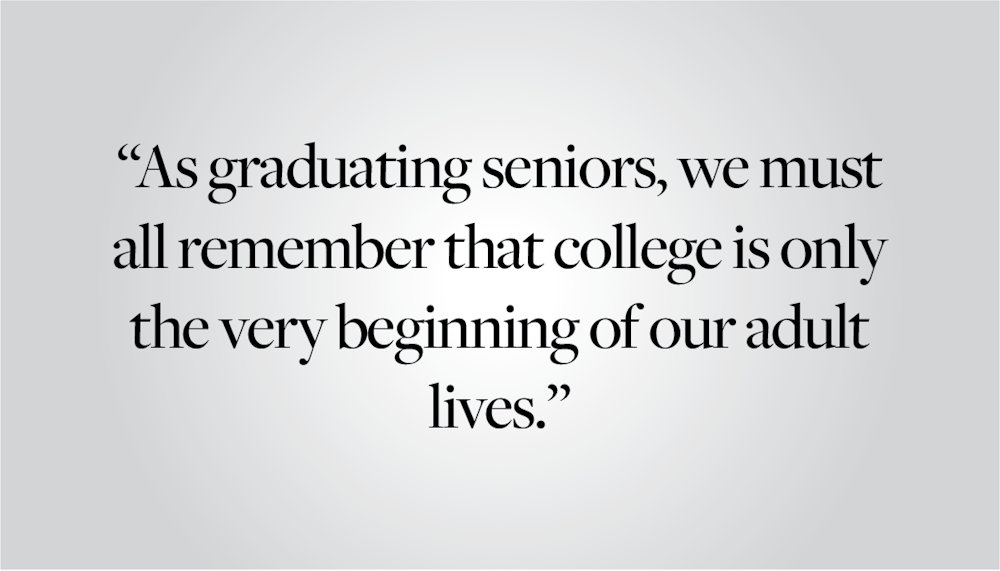“College is the best four years of your life.”
If I had a nickel for every time I heard that phrase, I could have paid my tuition in cash. Every time I think about that statement, it seems even bleaker. Why would anyone want to peak that early? As I reach the end of my undergraduate career, however, I can see some merit in that claim. I’ve made great memories and better friends, and I’ve learned far more than my transcript can attest to. Nevertheless, as graduating seniors, we must all remember that college is only the very beginning of our adult lives.
The idea that our college years are supposed to be the best years of our lives is unrealistic at best and depressing at worst. For the class of 2023 in particular, college has been a whirlwind: Our early days were defined by pre-COVID normalcy, but the pandemic covered a lot of our collegiate ground. We found new ways to stay connected, but the truth is that our joys were limited. So much for parties in sweaty basements and casual run-ins with classmates at Mike’s Calzones.
Sure enough, these things came back to us, if not last year, then certainly this year. Somewhere in the mess of time flying and mental health struggles, our college years settled firmly behind us. And yet we’re told that, at 21 and 22, we’ve already reached the apex of our encounters with learning, fun, heartbreak, joy, failure and every other interesting experience out there. But it seems impossible to me that the most interesting thing that we’ll ever do is sit over-caffeinated in the Blue Room, stressed about a paper that we should have started writing days ago. Our college days may be behind us, but what is in front of us is a broad spectrum of possibilities that can either scare us or empower us, depending on our level of optimism.
It is important, however, to recognize the legitimate challenge that the transition from college to “the real world” poses. Moving at any point in life can be an emotional trauma, as leaving an established routine and a stable support system can be disorienting and disquieting. The fact that the American Psychological Association offers specific ways to cope with post-grad depression and anxiety certainly suggests that there will be rocky times ahead. It’s for that reason that I won’t fall into the trap of saying that our 20s will be “the best years of our lives;” that would be just as flawed as saying the same about college. But the hopeful difference between the rest of our adult lives and college is that, after college, we have much more time to balance what we lose with what we gain, whatever that may mean for each of us.
It’s also important to resist the pressure to see ourselves as fully-formed adults who need to have everything figured out right now. I frequently joke that before college, not only was I not yet an adult, but I wasn’t even a person. “I was just an amorphous blob of uncooked goo,” I say with equal parts irony and sincerity. Having grown from that point into what I can now proudly call a solidly formed person, I’m well aware of the fact that moving into a new age cohort with different life expectations will likely lead to a feeling of underdevelopment or unpreparedness. It’s important to accept that possibility and to embrace uncertainty, aimlessness and a lot of trial and error.
It’s easy to feel like everything is coming to an end right now, and it’s easy to get overwhelmed by that. And in truth, a lot is coming to an end. But so much more is beginning. It’s hard to trust the future to deliver when you can’t see it yet. Not all of us are religious people, but this is where faith of any kind is critical. We don’t have to see everything that awaits us – careers, love, family, success, peace of mind – to believe it will all be ours soon enough. We may not be cats who always land on our feet, but, if we keep practicing, we just might stick the landing when we least expect it.
Yasmeen Gaber ’23 can be reached at yasmeen_gaber@brown.edu. Please send responses to this opinion to letters@browndailyherald.com and other op-eds to opinions@browndailyherald.com.





